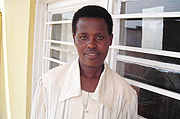BONNY MUKOMBOZI meets gorilla doctor Elizabeth Nyikaragira At a beautiful spot in the Volcano National Park, I meet Elizabeth Nyikaragira. She is watching the sky and smiles occasionally. Many people have warned me that speaking to Nyikaragira is as hard as squeezing water out stone. Nyikaragira has been attending to the mountain gorillas for the last 21 years. She loves it. “I am not a very busy person. Many times, I find time to talk to journalist,” Nyikaragira says as we sit down for the interview last week.


BONNY MUKOMBOZI meets gorilla doctor Elizabeth Nyikaragira
At a beautiful spot in the Volcano National Park, I meet Elizabeth Nyikaragira. She is watching the sky and smiles occasionally. Many people have warned me that speaking to Nyikaragira is as hard as squeezing water out stone.
Nyikaragira has been attending to the mountain gorillas for the last 21 years. She loves it. "I am not a very busy person. Many times, I find time to talk to journalist,” Nyikaragira says as we sit down for the interview last week.
"I have no regrets. Attending gorillas has been my calling,” she says. Throughout the interview, she keeps reminding me why it is necessary to protect gorillas from extinction.
She was only 9 when Nyikaragira saw some mountain gorillas sneak out of the park. They were being hunted by the poachers.
"I felt so bad. From that day, I felt I needed to something to protect the animals.”
"The passion for gorillas is inborn. They have become part of me I think,” she adds.
Born in 1963, in the Virunga massif, Nyikaragira went to Ecole Primary de Tembo, in Ruhengeri. She later joined Ecole Secondaire Rubirizi. She went on to read veterinary medicine.
After school, she was given a job, working as a vet for the gorillas. After four years, she a attended a two year training course at Ecole de Specialiste de la Fauna in Cameroon where she specialised in animal health.
A single mother of three, Nyikaragira raised the children after her husband died during the rebel insurgence in 1996. When the rebels struck, they were pushed back but her husband had died in the process.
"Yes, it was bad news. It was hell,” Nyikaragira remembers.
But despite the tragedy, she feels she has accomplished something big.
"I try to manage to balance domestic work with the jungle activities,” she says.
"I used to have some difficulties while climbing the mountain especially when I was pregnant,’’ she says. By 5.00 a.m., Nyikaragira has to be awake to join her workmates. They head to check on the gorillas.
"I move with a binoculars, gloves and a notebook to take notes on the health as we monitor the unusual discharges or the breathing patterns,’’ she says excitedly.
Nyikaragira, together with an expert team from mountain gorilla veterinary project, examines the health of gorillas on a rotational basis at least once a day.
She says pneumonia is the most notable disease attacking the baby gorillas. The young are the most vulnerable victims, though other sickness such as scabies are also a problem.
"Respiratory diseases sometimes attack the gorillas too,” she reveals.
Every gorilla has got its family, if it strolls away, it faces trouble as members of another family are likely to attack. They can sometimes leave it dead. So the vets have to ensure that gorillas don’t stray for from their families.
"Now that the surrounding communities appreciate the value of the gorillas, there is a new approach to conservation,” enthuses Nyikaragira.
"Though I feel sad when sometimes we have to get the gorilla out of the snare; much education has to be done.”
"What do you hope to do after retiring?” I ask. She smiles and looks down. "I hope to keep poultry.”
Ends


